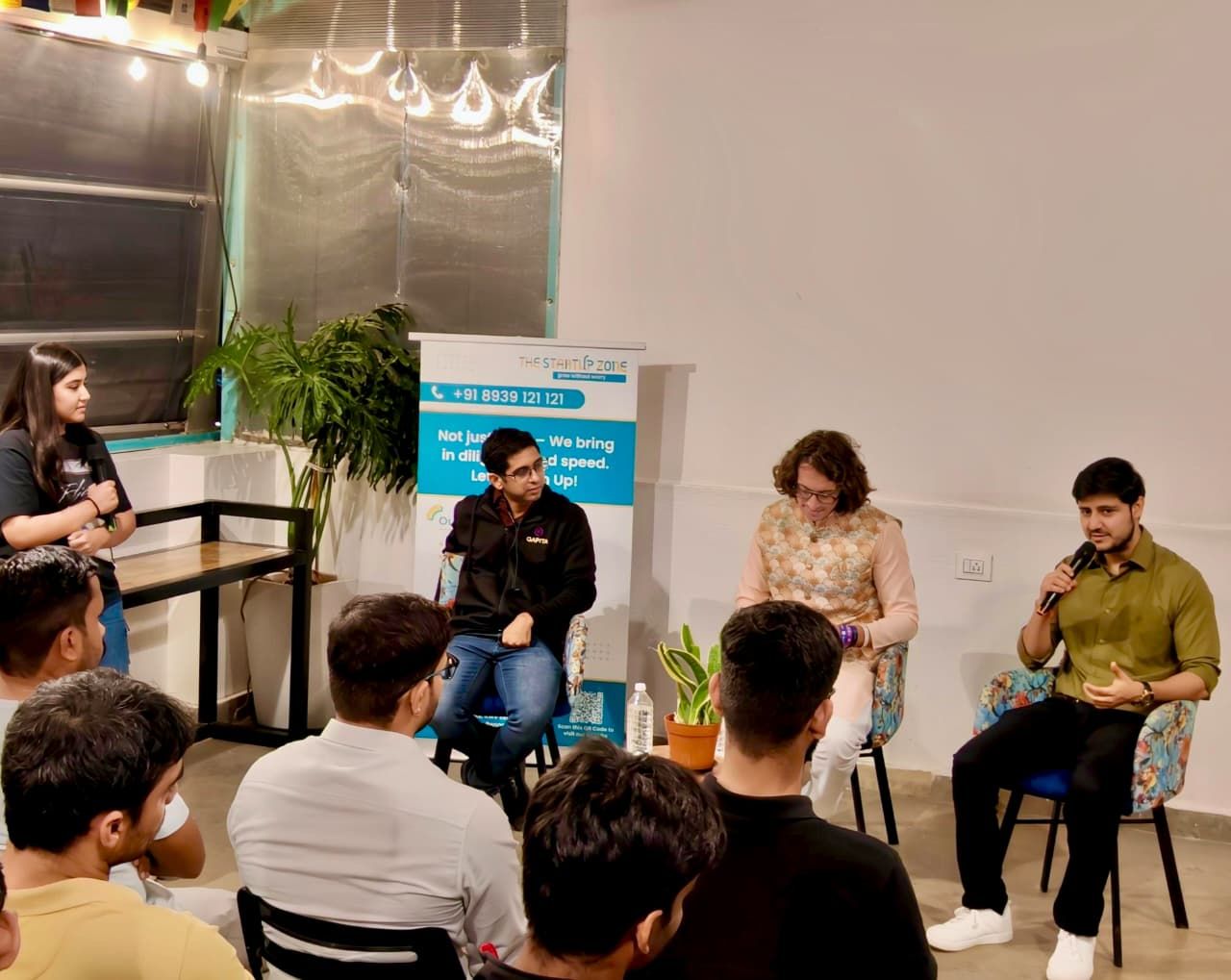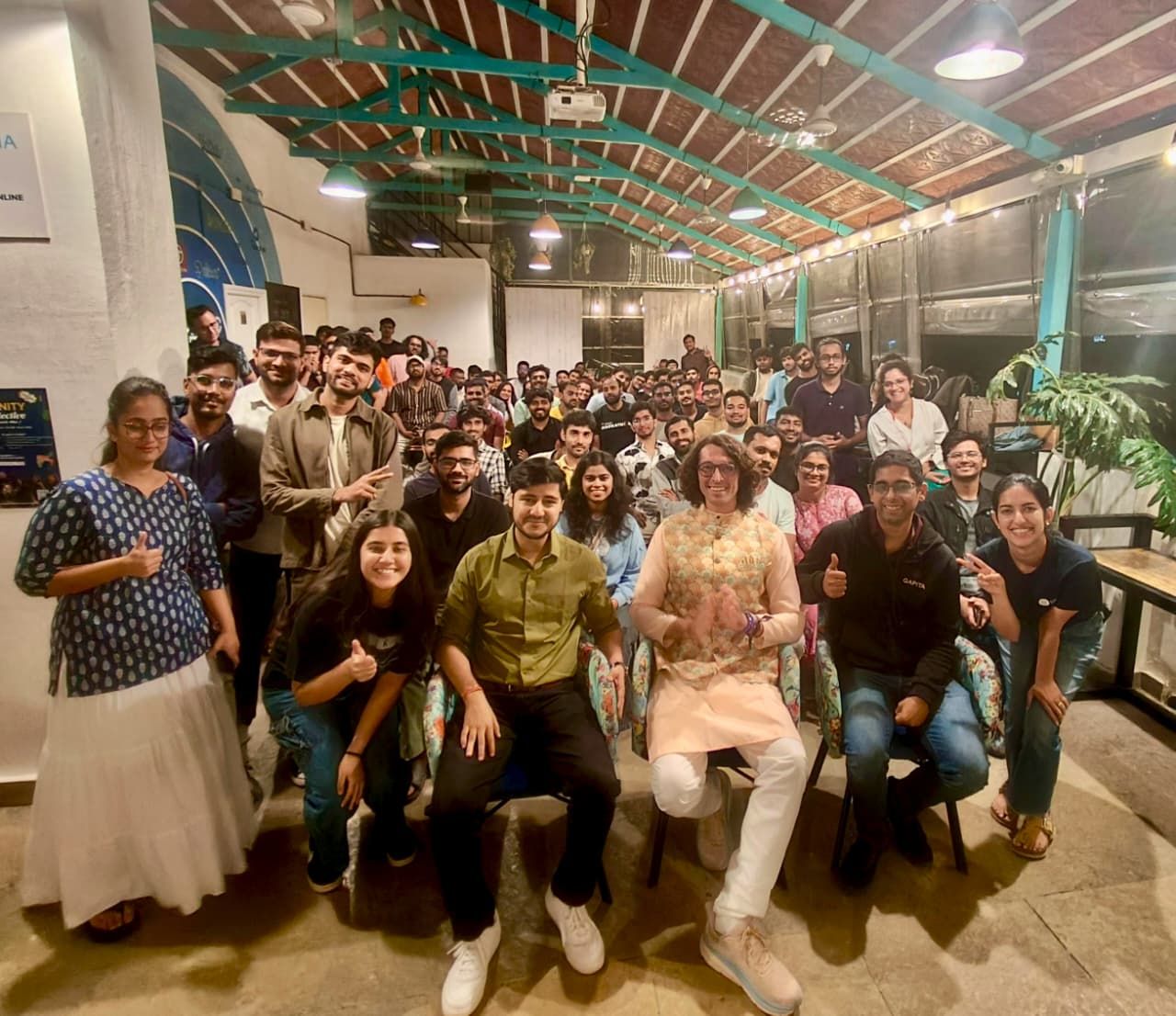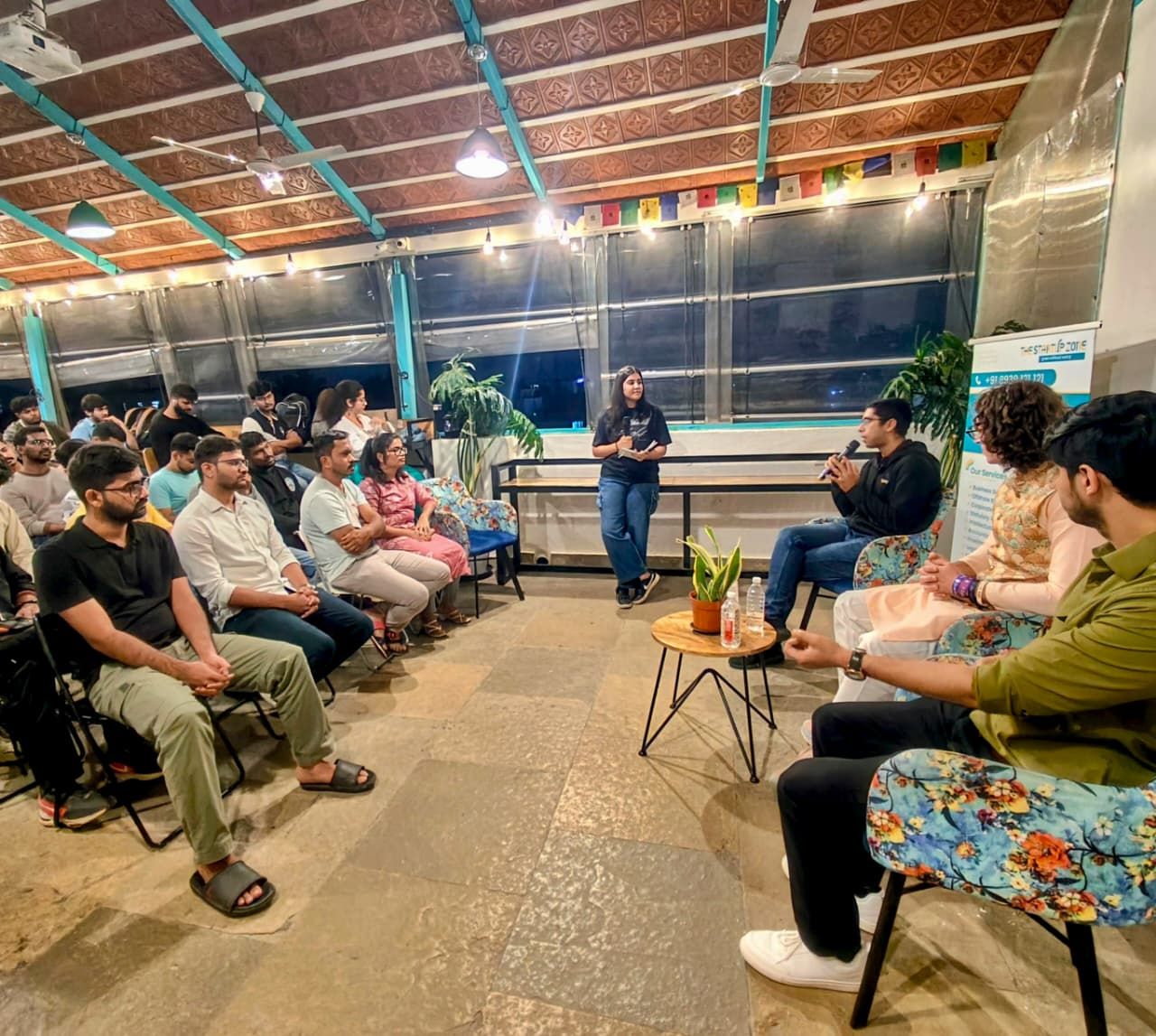Blessing in disguise
Books for Entrepreneurs
Documentary
eChai Wall of Love
How I Met My Co-Founder
In Focus Today
Insight Reports
Movies for Entrepreneurs
Notes from Podcasts
Slice of Startup Life
The First Hire
The First Welcome in Silicon Valley
The Reading Room
Unforgettable Lessons
The Quiet Art of Giving Things a Second Life

Every culture has its own way of saving what still has life left in it. A piece of cloth turned into a kitchen rag. A cracked bowl mended with care. A shirt stitched again and again until it feels softer than new. Long before words like sustainability or upcycling were fashionable, people simply knew how to make things last. That quiet instinct to reuse, to repair, to give another chance is where dwij finds its meaning.
“dwij means ‘second life’ in Sanskrit,” says Soumya Kalluri, the founder of the Mumbai-based social enterprise. “That’s what we try to give to materials the world has already given up on.”
Soumya began dwij in 2018 with a simple idea: to turn old jeans into something beautiful, useful, and lasting. Today, the brand transforms post-consumer and post-industrial denim into design-driven products such as bags, totes, jewelry, home décor, and handcrafted toys. “We rescue what would otherwise end up in landfills or be incinerated,” she explains. “Every piece is upcycled with care, either in our own workshop or by women from self-help groups who earn additional income through the work.”
Her path to building dwij did not begin in fashion. A mechanical engineer by training, she first explored sustainability during her Master’s in Commercial Vehicle Technology in Germany. “My post-graduation thesis was on the Life Cycle Assessment of commercial vehicles,” she recalls. “That’s when I realized how important it is to think about the end of life of a material. Sustainability does not stop at production; it continues long after something leaves the factory.”
In Germany, she also saw a version of consumerism that felt effortless yet troubling. “Donation boxes were everywhere,” she says. “It was easy to buy more, wear something a few times, and drop it off feeling guilt-free. When I came back to India and studied the textile waste problem, I realized we needed better answers, not just for waste but for awareness.”
dwij became that answer. Inside its Mumbai workshop, the air carries the sound of scissors slicing through faded denim and the hum of sewing machines steadying into rhythm. “No two dwij products are identical,” Soumya says. “Each one has its own story, its own texture, its own shade of blue.” Every piece is prewashed in industrial washers, ensuring it is hygienic and strong. Every element, from stitch to strap to button, is chosen to last.
Since inception, dwij has upcycled more than 15,000 pairs of jeans, 2,500 meters of post-industrial denim, and 1,000 meters of recycled PET felt fabric. “It is equivalent to taking 883 electric cars off the road for a year,” Soumya says. “Or planting over 16,000 tree seedlings and nurturing them for a decade.” The company is certified by the Ministry of Textiles, Government of India, and incubated at NSRCEL, IIM Bangalore.
What makes dwij distinct is its culture. “We encourage skill development,” Soumya says. “A tailor can suggest a new design. A designer can help with social media. It is a flat structure where learning is continuous.” The result is a brand that feels small in structure but expansive in spirit, part workshop, part design studio, part community.
Soumya has noticed a shift in what customers seek. “People today want products with stories,” she says. “They are looking for things that feel personal, functional, and thoughtful. Our goal is to create designs that reflect that, products that carry emotion as much as utility.” dwij’s bags, accessories, and home pieces reflect a quiet confidence with minimalist silhouettes, strong textures, and subtle color palettes that make sustainability feel stylish rather than moral.
The journey has required patience and persistence. “Sourcing post-consumer jeans in a scalable and hygienic way took time. Many people still equate upcycling with lower quality,” Soumya shares. “But we kept refining one process, one pattern, one perception at a time. Sustainability takes patience. It is about persistence more than perfection.”
As dwij grows, Soumya is exploring how traditional Indian crafts can merge with circular design. “We have started with denim,” she says. “Next, we are bringing in hand embroidery, appliqué, and other artisanal techniques. There is so much beauty in giving something old a touch of craft and a second story.”
Toward the end of our conversation, she looks at a stack of newly finished bags waiting to be shipped. “When we create something from what others throw away,” she says softly, “we are not just saving fabric. We are learning to pause, to notice, and to value what already exists.”
And that is what makes dwij more than a sustainability brand. It is a design philosophy disguised as a workshop. A reminder that innovation is not always about invention; sometimes it is about attention. The future may not lie in what we build next but in how we choose to keep what we already have.
“dwij means ‘second life’ in Sanskrit,” says Soumya Kalluri, the founder of the Mumbai-based social enterprise. “That’s what we try to give to materials the world has already given up on.”
Soumya began dwij in 2018 with a simple idea: to turn old jeans into something beautiful, useful, and lasting. Today, the brand transforms post-consumer and post-industrial denim into design-driven products such as bags, totes, jewelry, home décor, and handcrafted toys. “We rescue what would otherwise end up in landfills or be incinerated,” she explains. “Every piece is upcycled with care, either in our own workshop or by women from self-help groups who earn additional income through the work.”
Her path to building dwij did not begin in fashion. A mechanical engineer by training, she first explored sustainability during her Master’s in Commercial Vehicle Technology in Germany. “My post-graduation thesis was on the Life Cycle Assessment of commercial vehicles,” she recalls. “That’s when I realized how important it is to think about the end of life of a material. Sustainability does not stop at production; it continues long after something leaves the factory.”
In Germany, she also saw a version of consumerism that felt effortless yet troubling. “Donation boxes were everywhere,” she says. “It was easy to buy more, wear something a few times, and drop it off feeling guilt-free. When I came back to India and studied the textile waste problem, I realized we needed better answers, not just for waste but for awareness.”
dwij became that answer. Inside its Mumbai workshop, the air carries the sound of scissors slicing through faded denim and the hum of sewing machines steadying into rhythm. “No two dwij products are identical,” Soumya says. “Each one has its own story, its own texture, its own shade of blue.” Every piece is prewashed in industrial washers, ensuring it is hygienic and strong. Every element, from stitch to strap to button, is chosen to last.
Since inception, dwij has upcycled more than 15,000 pairs of jeans, 2,500 meters of post-industrial denim, and 1,000 meters of recycled PET felt fabric. “It is equivalent to taking 883 electric cars off the road for a year,” Soumya says. “Or planting over 16,000 tree seedlings and nurturing them for a decade.” The company is certified by the Ministry of Textiles, Government of India, and incubated at NSRCEL, IIM Bangalore.
What makes dwij distinct is its culture. “We encourage skill development,” Soumya says. “A tailor can suggest a new design. A designer can help with social media. It is a flat structure where learning is continuous.” The result is a brand that feels small in structure but expansive in spirit, part workshop, part design studio, part community.
Soumya has noticed a shift in what customers seek. “People today want products with stories,” she says. “They are looking for things that feel personal, functional, and thoughtful. Our goal is to create designs that reflect that, products that carry emotion as much as utility.” dwij’s bags, accessories, and home pieces reflect a quiet confidence with minimalist silhouettes, strong textures, and subtle color palettes that make sustainability feel stylish rather than moral.
The journey has required patience and persistence. “Sourcing post-consumer jeans in a scalable and hygienic way took time. Many people still equate upcycling with lower quality,” Soumya shares. “But we kept refining one process, one pattern, one perception at a time. Sustainability takes patience. It is about persistence more than perfection.”
As dwij grows, Soumya is exploring how traditional Indian crafts can merge with circular design. “We have started with denim,” she says. “Next, we are bringing in hand embroidery, appliqué, and other artisanal techniques. There is so much beauty in giving something old a touch of craft and a second story.”
Toward the end of our conversation, she looks at a stack of newly finished bags waiting to be shipped. “When we create something from what others throw away,” she says softly, “we are not just saving fabric. We are learning to pause, to notice, and to value what already exists.”
And that is what makes dwij more than a sustainability brand. It is a design philosophy disguised as a workshop. A reminder that innovation is not always about invention; sometimes it is about attention. The future may not lie in what we build next but in how we choose to keep what we already have.
A small AI x Healthcare circle is coming together in Palo Alto

i’m hosting a small, high-intent gathering in palo alto with eChai Ventures and Khyati Brahmbhatt designed for tech founders, med-tech builders, VC funds, and students who want to understand where ai x healthcare is truly heading.
the focus is simple:
real conversations on ai, healthcare systems, founder pain points, clinical pathways, and what it takes to go from 0→1 in this space. no panels, no long presentations — just builders talking to builders.
if you’re:
• building in ai, healthcare, med-tech, vr-wellness, or infra
• running an early-stage startup
• investing in the future of care delivery
• a student exploring ai-healthcare
this room will be useful for you.
please tag people who should be in this room — founders, researchers, engineers, operators, VCs.
the goal is to bring together the right minds before the sf → boston → global wave of ai-healthcare kicks into its next cycle.
looking forward to meeting you.
https://luma.com/45dj2bk4
the focus is simple:
real conversations on ai, healthcare systems, founder pain points, clinical pathways, and what it takes to go from 0→1 in this space. no panels, no long presentations — just builders talking to builders.
if you’re:
• building in ai, healthcare, med-tech, vr-wellness, or infra
• running an early-stage startup
• investing in the future of care delivery
• a student exploring ai-healthcare
this room will be useful for you.
please tag people who should be in this room — founders, researchers, engineers, operators, VCs.
the goal is to bring together the right minds before the sf → boston → global wave of ai-healthcare kicks into its next cycle.
looking forward to meeting you.
https://luma.com/45dj2bk4
When Founders Travel, Community Travels With Them <> Cape Town Founders Social

One of the things we have seen at eChai Ventures over the years is how founders host founders when they travel. When someone is in a new city for work, building partnerships, or exploring, instead of scattered one-to-one coffees, we bring people together in one place. It becomes an easy and friendly entry point to understand the local ecosystem.
This Wednesday, we are doing that in Cape Town, South Africa. A small Founders Social at The Vineyard, Newlands, for founders and operators to meet, share what they are building, exchange experiences, and see where conversations go.
It will be hosted by Keval Padia and Rajiv Patil from Nimblechapps, who are spending time in South Africa working with teams on product development and MVP launches. Solly Moeng will also be joining. He works across reputation strategy and stakeholder communication, bringing a grounded perspective to the room.
This Wednesday, Nov 12, 6 to 8 pm
The Vineyard, 60 Colinton Rd, Newlands.
If you are in Cape Town, or know someone who is, DM me or Keval Padia. Happy to share details or help you loop in friends who might enjoy being part of this.
This Wednesday, we are doing that in Cape Town, South Africa. A small Founders Social at The Vineyard, Newlands, for founders and operators to meet, share what they are building, exchange experiences, and see where conversations go.
It will be hosted by Keval Padia and Rajiv Patil from Nimblechapps, who are spending time in South Africa working with teams on product development and MVP launches. Solly Moeng will also be joining. He works across reputation strategy and stakeholder communication, bringing a grounded perspective to the room.
This Wednesday, Nov 12, 6 to 8 pm
The Vineyard, 60 Colinton Rd, Newlands.
If you are in Cape Town, or know someone who is, DM me or Keval Padia. Happy to share details or help you loop in friends who might enjoy being part of this.
When Rejection Becomes Redirection

One of my founder friends, Shalin Parikh, recently invited me to visit the new global headquarters of MYCPE One. During our conversation, we began talking about turning points, the moments that don’t look like opportunities at first but end up shaping everything that follows. That’s when the theme of Blessing in Disguise came up.
Shalin smiled and said, “My story actually starts with a rejection.” Back in 2006, he had just qualified as a Chartered Accountant, ambitious, prepared, and convinced that hard work and credentials were enough to open doors. Around that time, he interviewed with Fenil Shah, who was then the India lead for Analytix Solutions (then called Sunbelt Solutions). “I was armed with ambition and credentials,” he said. “Fenil interviewed me, and rejected me.”
It wasn’t the outcome he had imagined. He still remembers the exact words that stayed with him long after the interview ended: “What I respect is logic, not the designation or the degree of qualification.” At the time, it hurt. “I thought my qualification should have spoken for itself,” Shalin told me. “Had he hired me, I’d probably have been working at Analytix Solutions today.”
But time doesn’t erase moments like these; it reframes them. What feels like a wound in one season often becomes wisdom in another. The sentence that once cut deep would later become a quiet compass, shaping how Shalin thought about work, people, and the idea of merit itself. That day, he learned that qualification opens a door, but logic keeps it open. And while he couldn’t have seen it then, that rejection was quietly rewriting the direction of his life.
Nineteen years later, Shalin’s story had come full circle. MYCPE One had grown into a global platform, and the company he built had become twice the size of the one that once turned him down. “As Charlie Chaplin said, ‘Life is a tragedy when seen in close-up, but a comedy in long-shot,’” Shalin reflected. “What once felt like rejection turned out to be one of life’s greatest redirections.” It was a lesson in patience, something he often connects to Warren Buffett’s wisdom: “The stock market is designed to transfer money from the impatient to the patient.” “The same could be said for success,” he said. “Patience, persistence, and perspective turn short-term setbacks into long-term defining moments.”
When MYCPE One inaugurated its corporate headquarters, Shalin invited Fenil Shah as a guest. “We laughed about that interview from years ago,” he recalled. “I told him, ‘I can’t thank you enough for rejecting me. Back then, I cursed you. But if you had accepted me, none of this would have happened.’” Fenil smiled and replied, “Then I deserve founder’s equity in your company, where’s my share?”
It’s a story that captures the essence of Blessing in Disguise, how time turns sting into story, how perspective reframes loss as lesson, and how every “no” can quietly shape the path to a much larger “yes.”
Some rejections don’t close paths; they clear them. Some detours don’t delay success; they define it. And sometimes, the people who once said no end up being part of the story you’re proudest to tell. Maybe that’s what building really is, the slow realization that life was never working against you; it was just waiting for you to see the long shot.
But time doesn’t erase moments like these; it reframes them. What feels like a wound in one season often becomes wisdom in another. The sentence that once cut deep would later become a quiet compass, shaping how Shalin thought about work, people, and the idea of merit itself. That day, he learned that qualification opens a door, but logic keeps it open. And while he couldn’t have seen it then, that rejection was quietly rewriting the direction of his life.
Nineteen years later, Shalin’s story had come full circle. MYCPE One had grown into a global platform, and the company he built had become twice the size of the one that once turned him down. “As Charlie Chaplin said, ‘Life is a tragedy when seen in close-up, but a comedy in long-shot,’” Shalin reflected. “What once felt like rejection turned out to be one of life’s greatest redirections.” It was a lesson in patience, something he often connects to Warren Buffett’s wisdom: “The stock market is designed to transfer money from the impatient to the patient.” “The same could be said for success,” he said. “Patience, persistence, and perspective turn short-term setbacks into long-term defining moments.”
When MYCPE One inaugurated its corporate headquarters, Shalin invited Fenil Shah as a guest. “We laughed about that interview from years ago,” he recalled. “I told him, ‘I can’t thank you enough for rejecting me. Back then, I cursed you. But if you had accepted me, none of this would have happened.’” Fenil smiled and replied, “Then I deserve founder’s equity in your company, where’s my share?”
It’s a story that captures the essence of Blessing in Disguise, how time turns sting into story, how perspective reframes loss as lesson, and how every “no” can quietly shape the path to a much larger “yes.”
Some rejections don’t close paths; they clear them. Some detours don’t delay success; they define it. And sometimes, the people who once said no end up being part of the story you’re proudest to tell. Maybe that’s what building really is, the slow realization that life was never working against you; it was just waiting for you to see the long shot.
Founders and operators from Qapita, Bandit Network, and AI Palette joined the eChai Bangalore edition at Draper Startup House for a lively conversation on scaling startups and sustaining momentum

What a festive start to the week at Draper Startup House! 🪔✨
Co-hosted with eChai Ventures, we brought together one of the most vibrant and insightful panels — featuring:
🎤 Srikanth Prabhu – Qapita
🎤 Tony K. – Co-Founder, Bandit Network
🎤 Himanshu Upreti – Ai Palette
Three founders. Three very different journeys. One powerful conversation. ⚡
From Srikanth balancing his Qapita role while building two buzzing communities, to Tony landing his 5-year visa and showing up in full-on Diwali vibes outfit, to Himanshu sharing about AI Palette’s big acquisition by GlobalData Plc — this panel had it all: hustle, heart and humor.
Truly loved moderating this one — and soaking in all that entrepreneurial energy.
If this is how we kicked off Diwali week imagine what’s coming next! 🔥
Stay tuned (and drop by Draper!) for more conversations that spark ideas, connections and maybe a little chaos too.
Co-hosted with eChai Ventures, we brought together one of the most vibrant and insightful panels — featuring:
🎤 Srikanth Prabhu – Qapita
🎤 Tony K. – Co-Founder, Bandit Network
🎤 Himanshu Upreti – Ai Palette
Three founders. Three very different journeys. One powerful conversation. ⚡
From Srikanth balancing his Qapita role while building two buzzing communities, to Tony landing his 5-year visa and showing up in full-on Diwali vibes outfit, to Himanshu sharing about AI Palette’s big acquisition by GlobalData Plc — this panel had it all: hustle, heart and humor.
Truly loved moderating this one — and soaking in all that entrepreneurial energy.
If this is how we kicked off Diwali week imagine what’s coming next! 🔥
Stay tuned (and drop by Draper!) for more conversations that spark ideas, connections and maybe a little chaos too.

The eChai Effect - In Their Words
"At DevX.Work, we’ve greatly benefited from our association with eChai. Their events and networking forums have connected us with high-potential startups, ecosystem leaders, and innovation-driven professionals — many of whom have become valuable partners, collaborators, and even clients. What stands out most is the openness and accessibility of the community — whether you're an early-stage founder or an experienced entrepreneur, eChai provides a welcoming space to learn, collaborate, and grow. It's more than just a network — it's a catalyst for real, collaborative growth. We’re proud to be part of the eChai community. Highly recommended for any organization aiming to grow within the startup space."
Umesh Uttamchandani
Co-Founder, DevX
"If there’s one phrase that sums up my journey, it’s truly ‘The eChai Effect.’ Six years ago, I simply walked into my first eChai event, not knowing what to expect. The honest conversations, energy, and inspiration from founders and entrepreneurs struck a chord within me. That eChai spark became the catalyst for everything to follow. I proudly say: my entrepreneurship journey started—and keeps evolving—because of eChai. Redicine Medsol’s story is integrally linked to this community. I’ve gained so much, not just as a founder but as a forever volunteer and grateful member of the eChai family. With all my heart, thank you Jatin Bhai and everyone at eChai for shaping, guiding, and supporting my dreams. The eChai Effect will always be a part of my story."
Kush Prajapati
Founder, Redicine Medsol
"eChai isn’t just a startup community … it’s a mindset . eChai has been one of the most impactful communities in my entrepreneurial journey. It’s been a turning point . In a world where building something can often feel isolating, eChai gave me a sense of belonging. I’ve found mentors, collaborators, and friends here — people who genuinely want to see you succeed. It’s a space where ideas are challenged, actions are celebrated, and founders grow not just in scale, but in clarity and confidence. From late-night ideas to early-morning pitches, this community has quietly but powerfully shaped the way I build, think, and dream. I’ll always be grateful for the way eChai creates spaces where founders don’t just grow businesses — they grow together."
Koumal Kalantry
Founder, Bignano Ventures
eChai Partner Brands
eChai Ventures partners with select brands as their growth partner - working together to explore new ideas, open doors, and build momentum across the startup ecosystem.



